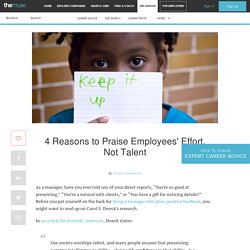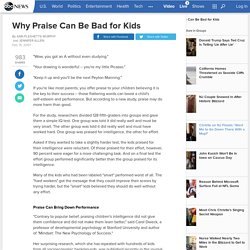

You Can Learn Anything- Inspirational Video. Michael Jordan Growth Mindset. Sessions - 2016 ESP February Conference. 2016 ESP Conference Keynote Address on Livestream. Session Presentation from 2/5 ESP Conference. One account.

All of Google. Sign in to continue to Slides Need help? Forgot password? Sign in with a different account Create account One Google Account for everything Google. Growth Mindset Praise Printable (Free) Does Your Workplace Have A Growth Mindset? « Michelle Mcquaid. How is success measured in your organization?

Is it all about the results you achieve? Or is about the effort that you make? If your workplace is like most, chances are it’s the results that matter most. After all the ability to successfully deliver outcomes – be it growth and profit, student results or community benefits – is the point of nearly every organization. But what if focusing primarily on results was undermining the very success your workplace was trying so hard to achieve? Professor Carol Dweck at Standford University has found that when it comes to achieving success, more important than believing in our abilities is the belief that we can improve upon our abilities.
You see when organizations only measure us by our outcomes, Dweck suggests that this creates a “fixed mindset” culture, where being smart and talented is prized above all other behaviors. How to Praise Your Employees. As a manager, have you ever told any of your direct reports, “You’re so good at presenting,” “You’re a natural with clients,” or “You have a gift for noticing details?”

Before you pat yourself on the back for being a manager who gives positive feedback, you might want to read up on Carol S. Dweck’s research. In an article for Scientific American, Dweck states: Our society worships talent, and many people assume that possessing superior intelligence or ability—along with confidence in that ability—is a recipe for success.
In fact, however, more than 30 years of scientific investigation suggests that an overemphasis on intellect or talent leaves people vulnerable to failure, fearful of challenges and unwilling to remedy their shortcomings. While this article focuses on raising children well, managers can glean similar insights from the findings. Encouraging a growth mindset has multiple benefits. 1. Complimenting the effort employees make also helps them overcome failures. 2. 3. 4. Growth Mindset for Parents Course. Growth Mindset Practices: Praise the Process. The Power (and Peril) of Praising Your Kids. What do we make of a boy like Thomas?

Thomas (his middle name) is a fifth-grader at the highly competitive P.S. 334, the Anderson School on West 84th. Slim as they get, Thomas recently had his long sandy-blond hair cut short to look like the new James Bond (he took a photo of Daniel Craig to the barber). Unlike Bond, he prefers a uniform of cargo pants and a T-shirt emblazoned with a photo of one of his heroes: Frank Zappa. Thomas hangs out with five friends from the Anderson School. They are “the smart kids.” Since Thomas could walk, he has heard constantly that he’s smart. But as Thomas has progressed through school, this self-awareness that he’s smart hasn’t always translated into fearless confidence when attacking his schoolwork. For instance, in the early grades, Thomas wasn’t very good at spelling, so he simply demurred from spelling out loud. Thomas is not alone. When parents praise their children’s intelligence, they believe they are providing the solution to this problem. Growth Mindset Feedback Tool.
Mindset Intro for Parents. Why Praise Can Be Bad for Kids. "Wow, you got an A without even studying.

" "Your drawing is wonderful -- you're my little Picasso. " "Keep it up and you'll be the next Peyton Manning. " If you're like most parents, you offer praise to your children believing it is the key to their success -- those flattering words can boost a child's self-esteem and performance. But according to a new study, praise may do more harm than good. For the study, researchers divided 128 fifth-graders into groups and gave them a simple IQ test. Asked if they wanted to take a slightly harder test, the kids praised for their intelligence were reluctant.
Many of the kids who had been labeled "smart" performed worst of all. Praise Can Bring Down Performance "Contrary to popular belief, praising children's intelligence did not give them confidence and did not make them learn better," said Carol Dweck, a professor of developmental psychology at Stanford University and author of "Mindset: The New Psychology of Success. " 'Mindset Revisited' by Carol Dweck (Education Week) Opinion By Carol Dweck For many years, I secretly worked on my research. I say “secretly” because, once upon a time, researchers simply published their research in professional journals—and there it stayed.
However, my colleagues and I learned things we thought people needed to know. Carol Dweck - A Study on Praise and Mindsets. Sesame Street: Janelle Monae- Power of Yet.